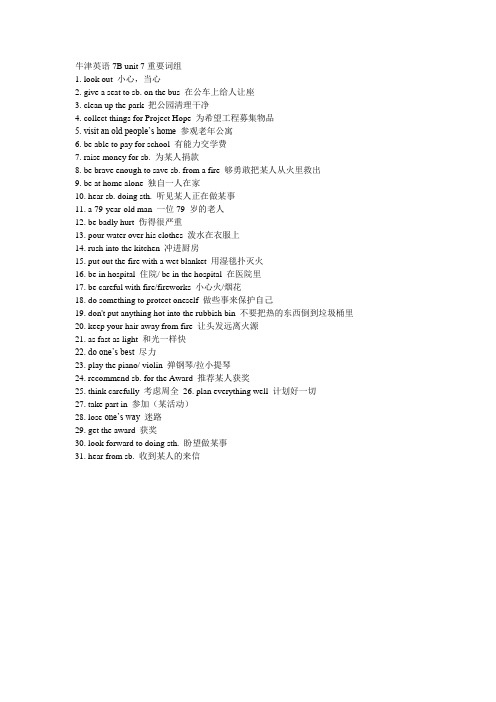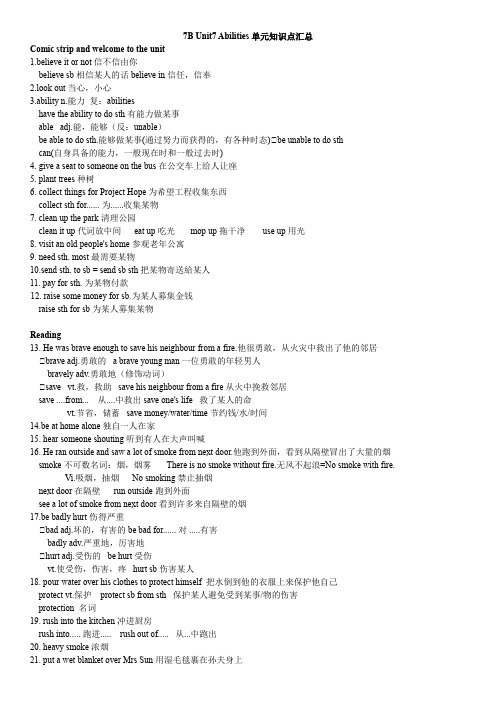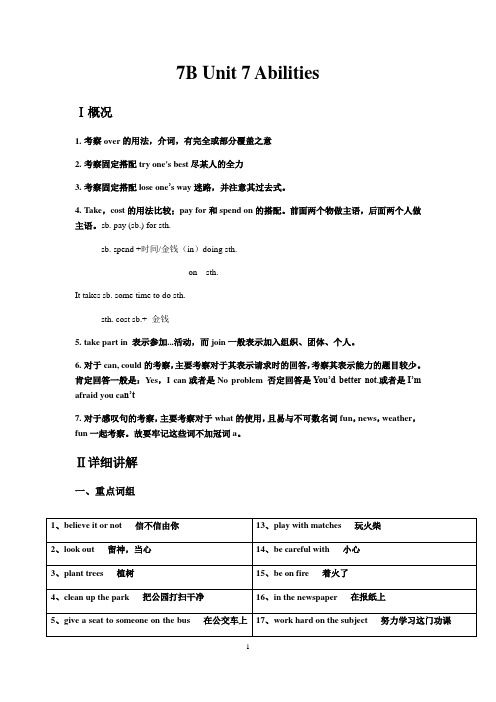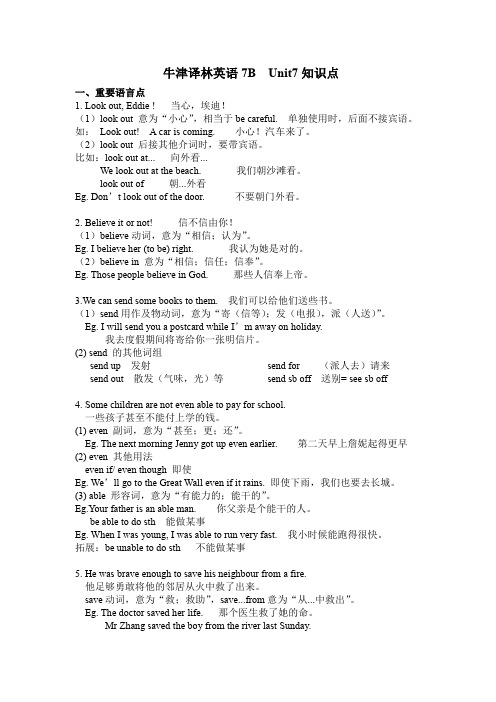(完整)江苏新版牛津英语7B-Unit-7-知识点,推荐文档
7B unit 7 重要词组 、句型归纳及翻译句子练习

牛津英语 7B unit 7 重要词组1. look out 小心,当心2. give a seat to sb. on the bus 在公车上给人让座3. clean up the park 把公园清理干净4. collect things for Project Hope 为希望工程募集物品5. visit an old people’s home 参观老年公寓6. be able to pay for school 有能力交学费7. raise money for sb. 为某人捐款8. be brave enough to save sb. from a fire 够勇敢把某人从火里救出9. be at home alone 独自一人在家10. hear sb. doing sth. 听见某人正在做某事11. a 79-year-old man 一位 79 岁的老人12. be badly hurt 伤得很严重13. pour water over his clothes 泼水在衣服上14. rush into the kitchen 冲进厨房15. put out the fire with a wet blanket 用湿毯扑灭火16. be in hospital 住院/ be in the hospital 在医院里17. be careful with fire/fireworks 小心火/烟花18. do something to protect oneself 做些事来保护自己19. don't put anything hot into the rubbish bin 不要把热的东西倒到垃圾桶里20. keep your hair away from fire 让头发远离火源21. as fast as light 和光一样快22. do one’s best 尽力23. play the piano/ violin 弹钢琴/拉小提琴24. recommend sb. for the Award 推荐某人获奖25. think carefully 考虑周全26. plan everything well 计划好一切27. take part in 参加(某活动)28. lose one’s way 迷路29. get the award 获奖30. look forward to doing sth. 盼望做某事31. hear from sb. 收到某人的来信7B Unit 7重点词组归纳1.小心look out2.植树plant trees3.清扫公园clean up the park4.在公共汽车上给人让座give a seat to someone on the bus 5参观老年之家. visit an old people’s home6. 为希望工程收集募捐东西collect things for project hope7. 贫困地区的孩子the children in poor areas8. 能够be able to9. 支付pay for10. 冲进 rush into11. 浓烟 heavy smoke12. 帮助…摆脱困难help…out13. 在医院in hospital14. 想想 think about15. 使…停止燃烧stop something from burning16. 顺便by the way17. 在学校演出上弹钢琴play the piano at school shows18. 其余的人the rest of them19. 拉小提琴play the violin20. 在六岁时at the age of six21. 一个有用的地方a useful place1. look out2. plant trees3. clean up the park4. give a seat to someone on the bus5. visit an old people’s home6. collect things for project hope7. the children in poor areas8. be able to9. pay for10. rush into11. heavy smoke12. help out13. in hospital14. think about15. stop something from burning16. by the way17. play the piano at school shows18. the rest of them19. play the violin20. at the age of six21. a useful place7B Unit 7重点句归纳1. Believe it or not! 信不信由你! (80)2. They need clothes and shoes most. 他们最需要衣服和鞋子。
新牛津英语7B Unit 7 reading

Later some firemen came and put out the fire. 后来一些消防员赶来扑灭了火。 put out 意思是“熄灭”,“关掉”, put out the fire = put the fire out,如: put out a light / the gas 关掉灯/煤气 put out a candle/cigarette 灭掉蜡烛/香烟
Do not play with matches.
Keep your hair away from fire.
Be careful with fireworks.
Do not put anything hot into the rubbish bin.
Discussion
The fire burnt Lin Tao’s arms, neck and face. Then he was in hospital for two weeks. Please discuss in groups of four:
He went in and found his neighbour, the 79-year-old Mrs Sun, in the kitchen. 他走进去,看到隔壁邻居79岁的孙奶奶正 在厨房。 在79-year-old这一结构中,词与词之间用连 字符连接,通常作定语,后接名词。如: She has a six-year-old daughter. 她有个6岁的女儿。
1. What do you think of Lin Tao? 2. What do you think of the fire? 3. Do you know how to escape from the fire? (pour … over)
牛津英语7Bunit7复习资料

⽜津英语7Bunit7复习资料⽜津英语7B Unit7复习资料1、收到某⼈的来信2、信不信由你3、当⼼,⼩⼼24、种树5、在公交车上给⼈让座6、为希望⼯程收集东西7、清理公园8、参观⽼年公寓9、最需要某物10、把某物寄/送给某⼈211、能做某事12、付款13、某⼈为某物付款给某⼈钱14、为某⼈募集资⾦15、获得⼀个奖16、从⽕灾中挽救邻居17、独⾃⼀⼈在家18、听到有⼈⼤声叫喊19、迷路220、跑到外⾯21、看到许多烟从隔壁冒出来22、⼀个8岁的男孩23、伤得严重24、快速跑到孙夫⼈的浴室25、把⽔倒到他的⾐服上来保护他⾃⼰26、需要帮助的⼉童27、冲进厨房28、浓烟29、⽤湿⽑毯裹在孙夫⼈⾝上30、帮助她出来33、住院两周34、就在那时235、有时间思考某事36、参加(活动)37、计划好每件事38、仔细考虑39、.阻⽌某⼈做某事40、为俱乐部做⼤多数电脑⼯作41、在(做)某事⽅⾯做得更好42、叫救命43、在6岁时44、着⽕了45、变得更好46、当⼼烟花47、玩⽕柴48、在……⽅⾯努⼒训练49、弹钢琴/拉⼩提琴50、使某⼈远离某物51、进⼊校队52、在你的⼿机上拨个电话53、把某物落在家54 顺便说⼀下55、随⾝携带你的相机56、没问题57、透过墙壁看到东西58、就像x光线59、听到远处的东西60、⽤他的⼿拦停⽕车61、飞得像光速⼀样快62、⽤眼睛烧东西63、需要多读,多说64、努⼒学习地理65、写出好⽂章68、推荐某⼈获得某物69、推荐某⼈做某事70、推荐丹尼尔获得今年的新星奖71、他是个多么勇敢的年轻⼈呀!72、这个年轻⼈多么勇敢啊!73、它是多么美妙的⾳乐!74、⾳乐多么美妙啊!75、别把热东西放⼊垃圾箱76、昨天我收到爷爷的来信。
77、当⼼!⼀辆公交车正朝我们开过来!78、.昨天我看见他⾛进⼀家医院。
79、这位母亲看着她的宝宝在房间⾥玩耍。
80、在我的房间前⾯有⼀棵⼗⽶⾼的树。
81、他⼤学毕业后在这家医院⼯作。
7B Unit7 Abilities单元知识点汇总

7B Unit7 Abilities单元知识点汇总Comic strip and welcome to the unit1.believe it or not信不信由你believe sb相信某人的话believe in信任,信奉2.look out当心,小心3.ability n.能力复:abilitieshave the ability to do sth有能力做某事able adj.能,能够(反:unable)be able to do sth.能够做某事(通过努力而获得的,有各种时态)➡be unable to do sthcan(自身具备的能力,一般现在时和一般过去时)4.give a seat to someone on the bus在公交车上给人让座5.plant trees种树6.collect things for Project Hope为希望工程收集东西collect sth for......为......收集某物7.clean up the park清理公园clean it up代词放中间eat up吃光mop up拖干净use up用光8.visit an old people's home参观老年公寓9.need sth. most最需要某物10.send sth. to sb= send sb sth把某物寄送給某人11.pay for sth.为某物付款12.raise some money for sb.为某人募集金钱raise sth for sb为某人募集某物Reading13.He was brave enough to save his neighbour from a fire.他很勇敢,从火灾中救出了他的邻居➡brave adj.勇敢的 a brave young man一位勇敢的年轻男人bravely adv.勇敢地(修饰动词)➡save vt.救,救助save his neighbour from a fire从火中挽救邻居save ....from... 从....中救出save one's life 救了某人的命vt.节省,储蓄save money/water/time节约钱/水/时间14.be at home alone独自一人在家15.hear someone shouting听到有人在大声叫喊16.He ran outside and saw a lot of smoke from next door.他跑到外面,看到从隔壁冒出了大量的烟smoke不可数名词:烟,烟雾There is no smoke without fire.无风不起浪=No smoke with fire.Vi.吸烟,抽烟No smoking禁止抽烟next door在隔壁run outside跑到外面see a lot of smoke from next door看到许多来自隔壁的烟17.be badly hurt伤得严重➡bad adj.坏的,有害的be bad for......对.....有害badly adv.严重地,厉害地➡hurt adj.受伤的be hurt受伤vt.使受伤,伤害,疼hurt sb伤害某人18.pour water over his clothes to protect himself把水倒到他的衣服上来保护他自己protect vt.保护protect sb from sth保护某人避免受到某事/物的伤害protection 名词19.rush into the kitchen冲进厨房rush into.....跑进.....rush out of..... 从...中跑出20.heavy smoke浓烟21.put a wet blanket over Mrs Sun用湿毛毯裹在孙夫身上22.help her out帮助地出来help sb out帮助某人摆脱困境23.put out the fire扑灭火put out扑灭24.burn one's arms烧伤了某人的胳膊burn-burned/burnt25.be in hospital for two weeks住院两周in hospital住院in the hospital在医院里26.at that moment= just then就在那时27.have time to think about sth.有时间思考某事28.nod vi.点头过去式:nodded 现在分词:nodding29.be careful with sth.小心某物be careful with fireworks当心烟花care vt.关心careful adj.仔细的,认真的,小心的careless --be careless粗心carefully adv.细心地,认真地,小心地30.stop sb. from doing sth.阻止某人做菜事31.hear about the news听说这个新闻news不可数名词:消息,新闻 a piece of news一则新闻No news is good news.没消息就是好消息32.Sth be on fire= sth catch a fire着火33.play with matches玩火柴match n.(可数)火柴/比赛vt.相配match sth well与....很配34.keep your hair from the fire使你的头发远离火keep sb. away from sth.使某人远离某物Grammar35.make a call on your mobile用你的手机打个电话36.leave sth. at home把某物落(忘)在家37.burn things with his eyes用他的眼睛烧东西38.hear things far away听到远处的东西39.What else can he do?他还能做什么?else adv.另外,其他通常放在特殊疑问词what/ who /which /when /where/ how等后面,或者放在something/ anything /nothing /anyone/ everyone等不定代词后other adj.其他的,别的后接名词40.fly as fast as light飞得像光一祥快41.情态动词➡定义:情态动词是一类用于表示说话人的语气和情态的助动词。
7B Unit7知识点梳理以及考点

7B Unit 7 AbilitiesⅠ概况1.考察over的用法,介词,有完全或部分覆盖之意2.考察固定搭配try one's best尽某人的全力3.考察固定搭配lose one’s way迷路,并注意其过去式。
4.Take,cost的用法比较;pay for和spend on的搭配。
前面两个物做主语,后面两个人做主语。
sb. pay (sb.) for sth.sb. spend +时间/金钱(in)doing sth.on sth.It takes sb. some time to do sth.sth. cost sb.+ 金钱5.take part in 表示参加...活动,而join一般表示加入组织、团体、个人。
6.对于can, could的考察,主要考察对于其表示请求时的回答,考察其表示能力的题目较少。
肯定回答一般是:Y es,I can或者是No problem 否定回答是You’d better not.或者是I’m afraid you ca n’t7.对于感叹句的考察,主要考察对于what的使用,且易与不可数名词fun,news,weather,fun一起考察。
故要牢记这些词不加冠词a。
Ⅱ详细讲解一、重点词组二、重要句型1、Believe it or not! 信不信由你!belive/think后可接that引导的宾语从句,当主语为第一人称,后接否定意义的宾语从句时,需要否定前移。
eg. 我认为他不会通过考试。
正:I don’t think/believe that he can pass the exam.误:I think/believe that he can’t pass the exam.2、We can send some books to them. 我们可以给他们送些书。
(过去式sent)send用作及物动词,意为“寄(信等);发(电报);(派人)送”。
牛津译林英语7B Unit7 Abilities 知识点

牛津译林英语7B Unit7知识点一、重要语言点1. Look out, Eddie ! 当心,埃迪!(1)look out 意为“小心”,相当于be careful. 单独使用时,后面不接宾语。
如:Look out! A car is coming. 小心!汽车来了。
(2)look out 后接其他介词时,要带宾语。
比如:look out at... 向外看...We look out at the beach. 我们朝沙滩看。
look out of 朝...外看Eg. Don’t look out of the door. 不要朝门外看。
2. Believe it or not! 信不信由你!(1)believe动词,意为“相信;认为”。
Eg. I believe her (to be) right. 我认为她是对的。
(2)believe in 意为“相信;信任;信奉”。
Eg. Those people believe in God. 那些人信奉上帝。
3.We can send some books to them. 我们可以给他们送些书。
(1)send用作及物动词,意为“寄(信等);发(电报),派(人送)”。
Eg. I will send you a postcard while I’m away on holiday.我去度假期间将寄给你一张明信片。
(2) send 的其他词组send up 发射send for (派人去)请来send out 散发(气味,光)等send sb off 送别= see sb off4. Some children are not even able to pay for school.一些孩子甚至不能付上学的钱。
(1) even 副词,意为“甚至;更;还”。
Eg. The next morning Jenny got up even earlier. 第二天早上詹妮起得更早(2) even 其他用法even if/ even though 即使Eg. We’ll go to the Great Wall even if it rains. 即使下雨,我们也要去长城。
最新江苏新版牛津英语7B-Unit-7-知识点

精品文档ShoppingUnit 7 Comic stripPart One重点全解(P 80)Believe it or not. 1、believe it or not意为“信不信由你”,是由whether you believe it or not变化而来,通常置于句首,后面加逗号,再接主句。
例如:Believe it or not, I heard from Xie Na.2、Look out, Eddie.(P 80)look out意为“留神;当心,小心”,多用于口语中,用来提醒人们注意当前的危险状态或不安全的场所及事物等,与be careful意思相近。
例如:Look out! The car is coming.3、People have different abilities.(P 80)ability此处用作可数名词,意为“能力”,形容词是able,意为“有能力的”。
①表示抽象意义的“能力”,为不可数名词。
例如:He is a man of ability.②表示不同种类的能力时,为可数名词,可用复数形式。
例如:Different people have different abilities.③侧重指智慧、天资、天分等方面的意义时,可数或不可数均可,有时还可用复数形式。
例如:The girl has a great musical ability. Everyone admired his abilities.④表示有能力做某事或具有做某事的能力等,其后通常要接动词不定式。
例如:I think Kitty has the ability to be our monitor.Part Two Welcome to the unitB重点全解1、We can send some to them.(P 81)send及物动词,意为“邮寄,发送,派遣”。
send sth to sb=send sb sth,意为“把某物寄给某人”,但当send后表示的词是代词时,只能用send sth to sb形式,而不能用send sb sth形式。
江苏新牛津译林版 7B 知识点汇总

Unit 1 Dream homes 一、重点词汇1、Would you like to live in a palace, Eddie? 艾迪,你想住在宫殿里吗?这里would like 是“想,想要”的意思,后面可以加名词或动词或动词不定式。
如:I’d like to go to the USA next year. 明年我想去美国。
2、I’d like to live next to a restaurant. 我想住在餐馆附近。
这里next to 是“附近,靠近的”的意思,相当于near。
如:The table is next to the window. 这张桌子在窗户旁。
3、Which country is this photo from, Amy? 艾米,这幅照片来自哪个国家?这里be from 相当于come from, 是“来自……”的意思。
如:Where is Mr Black from? 布莱克先生来自于哪儿?4、Is Tokyo the capital of Japan? 东京是日本的首都吗?句型结构为:The capital of +国家is +首都。
如:The capital of the UK is London. 英国首都是伦敦。
[拓展](1)capital n. 省会The capital of Jiangsu is Nanjing. 江苏省会是南京。
(2)capital n. 大写字母We should write in a capital at the beginning of a sentence. 句子的开头我们应该用大写字母。
(3)capital n. 资本,资金,资产personal capital 个人资产(4)capital adj. 顶好的,一流的He came up with a capital idea. 他想好一个绝妙的主意。
5、I like the kitchen best. 我最喜欢厨房。
- 1、下载文档前请自行甄别文档内容的完整性,平台不提供额外的编辑、内容补充、找答案等附加服务。
- 2、"仅部分预览"的文档,不可在线预览部分如存在完整性等问题,可反馈申请退款(可完整预览的文档不适用该条件!)。
- 3、如文档侵犯您的权益,请联系客服反馈,我们会尽快为您处理(人工客服工作时间:9:00-18:30)。
Part One Comic stripPart Two Welcome to the unit Unit 7 Shopping重点全解1、Believe it or not.(P 80)believe it or not 意为“信不信由你”,是由whether you believe it or not 变化而来,通常置于句首,后面加逗号,再接主句。
例如:Believe it or not, I heard from Xie Na.2、Look out, Eddie.(P 80)look out 意为“留神;当心,小心”,多用于口语中,用来提醒人们注意当前的危险状态或不安全的场所及事物等,与be careful 意思相近。
例如:Look out! The car is coming.3、People have different abilities.(P 80)ability 此处用作可数名词,意为“能力”,形容词是able,意为“有能力的”。
①表示抽象意义的“能力”,为不可数名词。
例如:He is a man of ability.②表示不同种类的能力时,为可数名词,可用复数形式。
例如:Different people have different abilities.③侧重指智慧、天资、天分等方面的意义时,可数或不可数均可,有时还可用复数形式。
例如:The girl has a great musical ability. Everyone admired his abilities.④表示有能力做某事或具有做某事的能力等,其后通常要接动词不定式。
例如:I think Kitty has the ability to be our monitor.B重点全解1、We can send some to them.(P 81)send 及物动词,意为“邮寄,发送,派遣”。
send sth to sb=send sb sth,意为“把某物寄给某人”,但当send 后表示的词是代词时,只能用send sth to sb 形式,而不能用send sb sth 形式。
例如:They sent me a box of toy.=They sent a box of toy to me.与send 有关的短语:send for 意为“派人去叫,派人去请”例如:He is ill. Please send for a doctor.send away 意为“撵走,开除”例如:The boss sent him away.send up 意为“发射”例如:Man-made satellites have been sent up into space by many countries.2、Some families are not even able to pay for pens and notebooks.(P 81)(1) be able to 意为“能,会”,表示能力,与can 同义。
例如:In the future, students will be able to study at home with the help of computers.辨析:be able to 与can①be able to 强调通过努力而获得的能力,而can 强调自身已具有的能力。
例如:She can sing the song in English.He will be able to sing this song in English, too.②be able to 强调一种结果,而can 只强调一种可能。
例如:Luckily, he was able to escape from the fire in the end.If he got here a few hours earlier, I could save him.③be able to 可以表示各种时态,而can 只有一般现在时和一般过去时两种时态。
例如:I could help you last night, but you didn’t come.Can you see it there?He is /was /will be able to help you.(2)pay for 意为“为...付款”,在句中常见的结构形式有:①pay (sb) money for sth 付钱给(某人)买某物例如:I have to pay them 20 pounds for this room each month.②pay for sth 付某物的钱例如:He couldn’t pay for the car at that time.③pay for sb 替某人付钱例如:Don’t worry! I’ll pay for you.④pay sb 付钱给某人例如:They pay us every month.⑤pay money back 还钱例如:May I borrow 12 yuan from you? I’ll pay it back next week.3 、We can raise some money for them to buy these things.(P 81)raise 及物动词,意为“募集”。
raise money for...意为“为...筹钱”。
例如:The students are raising money for a sick girl.raise 作及物动词时,还可意为“举起,提高,饲养”。
例如:Please raise your hand to answer this question.Don’t raise your voice.Some people raise cows in my hometown.Part Three Reading重点全解1、He was brave enough to save his neighbour from a fire. (P 82)(1)brave 形容词,意为“勇敢的”。
例如:He is a very brave boy.(2)save 及物动词,意为“救,救助”。
save...from 意为“从...中救出...”。
例如:The man saved a boy from the river yesterday.save 作及物动词还可意为“节约”。
例如:It is important for us to save water.2、Suddenly, he heard someone shouting “Fire! Fire! Help!”(P 82)hear sb doing sth 意为“听到某人在做某事”。
例如:Do you hear someone singing in the next room?辨析:hear sb doing sth 与hear sb do sth①hear sb doing sth 指听见某人正在做某事,强调听到的动作正在进行。
例如:When I went back to my room, I heard her reading English in the next room.②hear sb do sth 指听到某人做了或经常做某事,强调听到所做的事情已经结束或是经常性的行为。
例如:I heard her come in and go upstairs.I often hear the girl play the violin in the park.3、He went in and found his neighbour, the 79-year-old Mrs Sun, in the kitchen. (P 82)79-year-old 是一个合成形容词,意为“79 岁的”。
这种合成形容词通常在句中作前置定语,修饰后面的名词。
其结构形式有两种:①数词+名词例如:100-metre race five-year sleep three-year time②数词+名词+形容词例如:a five-year-old boy an 800-metre-long bridge4、Her left leg was badly hurt and she could not get out. (P 82)hurt 此处用作形容词,意为“受伤的”。
例如:If you get hurt, you should go to the hospital.hurt 可作及物动词,意为“使受伤,伤害”。
例如:I won't hurt you.hurt 还可作不及物动词,意为“(身体某部位)感到疼痛”。
例如:My back hurts.5、He poured water over his clothes to protect himself. (P 82)to protect himself 在这里是不定式短语作目的状语。
动词不定式(短语)作目的状语时,既可以放在句首,也可以放在句末,常译为“为了...”。
例如:To keep fit, my father has to give up smoking.6、He put a wet blanket over Mrs Sun and helped her out.(P 82)help sb out 意为“帮某人克服困难、解决问题、脱离危险”。
例如:The teacher often helps his students out.Could you help me out?7、Later some firemen came and put out the fire.(P 82)put out 及物动词短语,意为“扑灭;熄灭”。
当它的宾语是名词时,可以放在其后,也可以放在put 与out 之间;当宾语为代词时,只能放在put 与out 之间。
例如:The police put out the forest fire at last. = put the forest fire outDon’t smoke here. Please put it out.与put 有关的短语:put on 穿上put away 收拾好put off 推迟put up 举起,张贴8、He was in hospital for two weeks.(P 82)in hospital 是一个固定短语,意为“住院”。
例如:My uncle is in hospital and I must visit him.拓展:in hospital 住院in the hospital 在医院里at table 在吃饭at the table 在桌旁in front of 在...(外部)的前面in the front of 在...(内部)的前面go to school 去上学go to the school 去学校by sea 乘船by the sea 在海边go to bed 上床睡觉go to the bed 朝床边走去Part Four Grammar重点全解1、-- Can I borrow your bike, Millie?-- Yes, you can. Here you are.(P 85)“Here you are.”是英语中常用的句子,意思是“给你”或“你要的东西在这里”,用于别人向你要东西或借东西,你递给他时的应答语。
